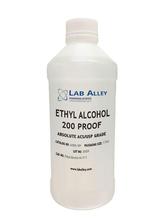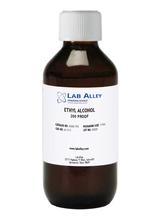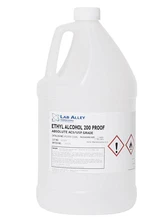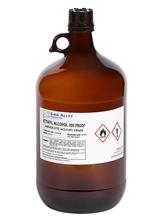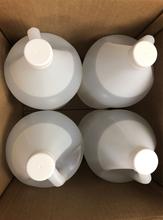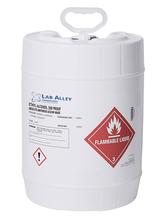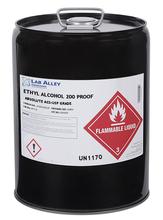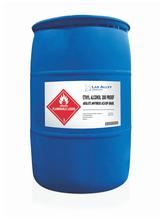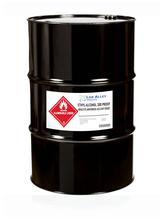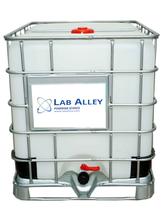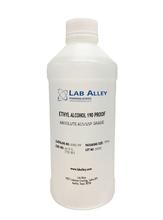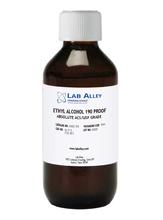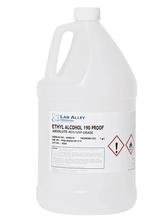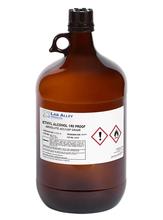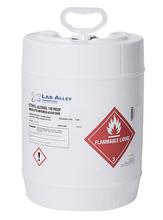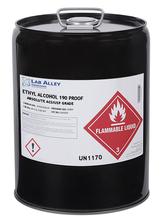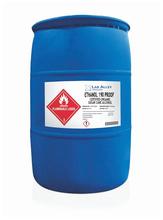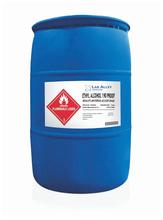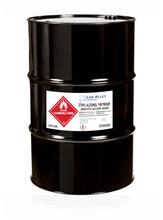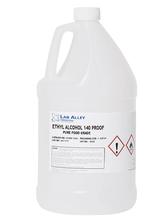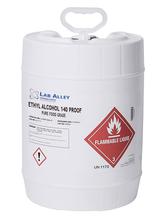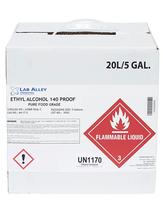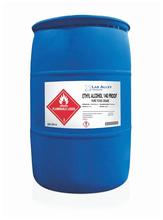Food Grade Alcohol Sanitizer For Sale Online | Made From Food Grade Ethanol For Sanitizing Surfaces And Equipment | Buy 70%, 95% & 100% Food Grade Alcohol Sanitizers
Pure 100% Food Grade Alcohol Sanitizer (200 Proof | Non-Denatured Ethanol | Ethyl Alcohol FCC/ACS/USP Grade) For Sale Online | Learn How To Dilute Here >
Pure 95% Food Grade Alcohol Sanitizer (190 Proof | Non-Denatured Ethanol | Ethyl Alcohol | FCC/ACS/USP Grade) For Sale Online | Learn How To Dilute Here >
Pure 70% Food Grade Alcohol (140 Proof | Non-Denatured Ethanol | Ethyl Alcohol | ACS/USP Grade) For Sale Online
Buy Safe Food Grade Alcohol Sanitizer (C2H5OH) (100% Alcohol) Online Here Or By Phone: 512-668-9918
If you have questions about ordering food grade alcohol sanitizer in bulk online here at LabAlley.com or would like to place an order, call 512-668-9918 or email customerservice@laballey.com to talk with a Food Grade Alcohol Sanitizer Specialist.
Buy food grade alcohol sanitizer online at LabAlley.com. The active ingredient in food grade sanitizers is ethanol. Food grade sanitizers are made from food grade ethanol and are used to sanitize surface and equipment. 70%, 95% and 100% food grade sanitizers are for sale in 1 pint bottles, 1 gallon bottles, 4x1 gallon cases, 5 gallon pails and bulk 55 gallon drums. You can use 70% food grade ethanol, 95% food grade ethanol or 100% food grade ethanol in food grade sanitizers.
Food grade alcohol sanitizers are used for foods, surfaces and hands and the best brands posses efficacy over multiple food borne illness-causing microorganisms.
Food Grade Ethanol Sanitizer Is Safe If Used Properly
Safe food grade alcohol sanitizers are often made from food grade ethanol purchased online at LabAlley.com. Food grade alcohol sanitizers are used to disinfect equipment and surfaces. The majority of food grade alcohol that has been ordered online at LabAlley.com in 2020 is being used by botanical extract makers and to make antiviral hospital grade disinfectants, hand sanitizers, virus disinfectants, antibacterial sprays, wipes and household cleaners.
The Food Chemicals Codex (FCC) is a compendium of internationally recognized standards for the identity, purity, and quality of food ingredients. FCC standards are recognized around the world by regulatory agencies, food processors, and ingredient suppliers as the basis for defining "food grade" ingredients.
Because food grade alcohol sanitizers ordered in 1 gallon bottles at LabAlley.com kills microorganisms like bacteria, fungi and viruses, it is used safely in the U.S. for personal care products such as antiviral hand sanitizers, virus disinfectants, astringents, botanical oils and extracts, and lotions. Food grade ethanol (alcohol), due to it's lack of additives, is considered a safe culinary solvent and is used in manufacturing processes, cosmetic manufacturing, herbal tincture production and food processing, where no harmful contaminants or additives are permitted to be present in the products produced. American consumers are allowed to purchase food grade alcohol sanitizers without a permit or license online at LabAlley.com. Businesses and manufacturers that use food grade sanitizers typically purchase it in 4x1 gallon cases, 5 gallon pails and bulk 55 gallon drums at LabAlley.com.
How To Make A 70% Food Grade Alcohol Sanitizer Solution
Food businesses must ensure that any chemical sanitizer used is “food grade”, as specified by labelling and material safety data sheets, and that it is used and stored in a manner that will not contaminate food. Food grade indicates that it is safe for food contact surfaces.
Keeping any area clean and free of germs and bacteria that can cause illness is extremely important for businesses of all types, but the food industry is often held to a higher standard due to regulations imposed by federal and state agencies. These agencies include the FDA, the Department of Health, and other agencies that regulate everything from the quality of the food to the cleanliness and safety of the environment where the food is cooked and served. Restaurants that don't adhere to these guidelines face extensive fines and risk being shut down. This is why it is so important that cleaning, sanitizing, and disinfecting routines are practiced regularly and correctly in the restaurant industry.
What Are Alcohol Hand Sanitizers?
Alcohol hand rub, gel or rinse sanitizers are disinfectants containing at least 60 per cent alcohol. Washing hands with warm water and soap is an effective method to remove visible dirt and reduce the number of germs on your hands. However, alcohol hand sanitizers can be used after washing hands with soap and water as an additional agent to kill germs or when soap and water handwashing is not possible. To use these products put an amount the size of your thumbnail in the palm of your hand and carefully rub your hands all over including under your nails. If your hands are visibly soiled, wash your hands using warm water and soap and dry them completely before applying the
alcohol hand sanitizer. The alcohol content will completely evaporate in approximately fifteen seconds. Alcohol hand sanitizers are safe for children to use under supervision. Since alcohol has a drying effect many of these products contain emollients to make them gentler on the skin. Numerous studies have confirmed alcohol hand sanitizers reduce the number of bacteria on the
hands of healthcare workers better than washing with soap and water and are as effective or more effective than washing with an antibacterial soap. Alcohol hand sanitizers are also less time consuming and more convenient, which research has shown to lead to improved and sustained hand hygiene initiatives. Also, alcohol hand sanitizers will not contribute to the emergence of microbial
resistance because there is no alcohol left behind to promote adaptation. The US Centers for Disease Control (CDC) recently released guidelines for hand hygiene in healthcare settings. The CDC recommends that if hands are not visibly soiled, healthcare workers should use alcohol based rubs between each patient when administering patient care. These recommendations are NOT
intended for food service personnel.
Is It Safe To Handle Food After Using An Alcohol Sanitizer?
Using a hand sanitizer before handling food is generally considered safe. In Canada, workers in the food industry are allowed to use alcohol hand sanitizers which have been approved by Health Canada. They are listed by the Canadian Food Inspection Agency as acceptable non-food chemical products. In the food service industry an alcohol hand sanitizer is most helpful as an extra hand disinfection step after washing hands with soap and water.
What Should I Consider When Buying Alcohol Sanitizers?
Alcohol hand sanitizers are not all the same. A thick gel or foam will prevent dripping and will maximize contact of alcohol and skin during cleaning. The effectiveness of the sanitizer depends on the amount and type of alcohol used. A range of 60 to 70 per cent alcohol is effective in reducing bacteria on the hands. In general, ethanol is better at destroying viruses than isopropanol, however both alcohols are effective at killing bacteria, fungi, and viruses.
Alcohol is flammable at the concentrations found in hand sanitizers. Alcohol hand sanitizers containing high concentrations of ethanol are more flammable than those containing isopropanol or mixtures of ethanol and isopropanol. Alcohol hand sanitizers are classified as hazardous materials and should be stored away from high temperatures or flames.
How To Make Food Grade Sanitizer
Make Your Own Sanitizing Solution
When was the last time you sanitized your kitchen sink? Keeping food safe involves more than keeping hot foods hot and cold foods cold. Although controlling food temperatures is key to food safety, cleaning and sanitation are also important. The kitchen sink is a harbor for bacteria to grow. Here is how bacteria can grow without you seeing them.
You decide to make scrambled eggs for breakfast. This calls for cracking eggs into a bowl. Add milk and seasonings and pour into a warmed skillet. Here is where bacteria get into your sink. Rinsing the bowl spreads raw egg mixture all around your sink. The bacteria is in the raw egg mixture. That is OK, just be sure you wash the bowl, utensil and sink with warm soapy water. Rinse and drain. Then add in the final step of spraying the sink with a sanitizing solution and let dry. This will stop any bacteria from the eggs growing in your sink.
Make Your Own Sanitizing Solution
Here's a recipe for your own sanitizing solution.
- Purchase a spray bottle.
- Keep away from children. Store where they cannot reach the spray bottle.
For Surfaces:
- 2 cups water
- 1/4 tsp unscented chlorine bleach
Store in a dark cabinet and replace solution once a week. An easy way to remember to make a new solution is to pick a day of the week that works for you. Ex. Every Sunday, make new sanitizing solution.
How To Disinfect Food And Your Kitchen For Virus
Here's how to wash up at home and after a grocery store visit when you're trying to sanitize against viruses. Family meals have a long tradition of increasing feelings of closeness and well-being, things that are more important than ever during the pandemic. But it’s key to prepare those meals in a clean, virus-free kitchen. As University of Michigan epidemiologist Aubree Gordon told HuffPost, “It’s really stressful times for everybody. Unless somebody in the home is ill, I would suggest people have family meals together.” That means more cooking and cleaning. Even when you’re not gathered around the table, it’s likely everybody will be in and out of the kitchen all day snacking or getting drinks. Here are some experts’ tips on keeping your kitchen clean and safe during this time. Please note that this advice is only for households in which everybody is currently healthy and free of viruses, the illness caused by the virus. Read more here.
- Download Ethanol Safety Data Sheets (SDS/MSDS) Here
- Buy Ethanol Online At LabAlley.com/Collections/Ethanol
- Ethanol Density: 789 kg/m³
- Ethanol Formula: C2H5OH
- Ethanol Solubility: Soluble In Water, Hexane, Chloroform, Water, Hexane, Diethyl Ether, Ethyl Acetate, Sodium Hydroxide (NaOH), Kerosene, Gasoline (Petrol), Carbon Tetrachloride (Tetrachloromethane/CCl4) And Heptane
- Solvent Miscibility Table
- Ethanol Miscibility: Completely Miscible
- Ethanol Structure: AKA Ethyl Alcohol, Abbreviated As EtOH, Ethanol Has One Methyl (-CH3) Group, One Methylene (-CH2-) Group And One Hydroxyl (-OH) Group
- Ethanol Boiling Point: 173.1°F (78.37°C)
- Ethanol Melting Point: -173.5°F (-114.1°C)
- Ethanol CAS Registry Number: 64-17-5
- Molar Mass: 46.07 g/mol
- Boiling Point: 173.1°F (78.37°C)
- IUPAC ID: Ethanol
- Ethanol ChemSpider ID: 682
- Ethanol PubChem CID: 702
- Ethanol Chemical Formula: C2H5OH | Can Be Written As CH3CH2OH
- Pka: Ethanol's pKa Value Is About 15.9
- Wikipedia Description Of Ethanol: Ethanol is a chemical compound and a simple alcohol. It is a volatile, flammable, colorless liquid with a slight characteristic odor.
- PubChem Description Of Ethanol: Ethanol is a clear, colorless liquid rapidly absorbed from the gastrointestinal tract and distributed throughout the body. It has bactericidal activity and is used often as a topical disinfectant. It is widely used as a solvent and preservative in pharmaceutical preparations as well as serving as the primary ingredient in alcoholic beverages. Indeed, ethanol has widespread use as a solvent of substances intended for human contact or consumption, including scents, flavorings, colorings, and medicines.
- Buy 190 Proof Alcohol Formula SDA 40B Denatured With tert-Butyl Alcohol For Compounding FDA Hand Sanitizers In Bulk 55 Gallon Drums
The Food Chemicals Codex (FCC) is a collection of internationally recognized standards for the purity and identity of food ingredients. It features roughly 1,200 monographs, including food-grade chemicals, processing aids, foods (such as vegetable oils, fructose, whey, and amino acids), flavoring agents, vitamins, and functional food ingredients (such as lycopene, olestra, and short chain fructooligosaccharides). The FCC also contains ingredients, such as sucrose and essential oils, that are not frequently found in other food additive standards resources.
The FCC has been published since 1966. It provides essential criteria and analytical methods to authenticate and determine the quality of food ingredients. FCC standards are used as agreed standards between suppliers and manufacturers in ongoing purchasing and supply decisions and transactions. The United States Pharmacopoeial Convention acquired the FCC in 2006. The FCC is published every two years in print and online formats and is offered as a subscription that includes a main edition and intervening Supplements.
The FCC has two primary sections: monographs and appendices. Monographs are listed alphabetically and typically cover a single ingredient. Monographs, where applicable, provide information about each ingredient, such as:
- Chemical Structure
- Chemical Formula
- Molecular Weight
- INS Number
- CAS Registry Number
- Function
- Definition
- Packaging
- Storage
- Labeling Requirements
- IR Spectra
There are also several "family" monographs, which cover substance groups. These include "Enzyme Preparations," "Food Starch," and "Spice Oleoresins." Additionally, specifications are included, consisting of a series of tests, procedures for the tests, and acceptance criteria. Monographs may also detail USP Reference Standards and/or other materials needed for test performance. The FCC's appendices contain step-by-step guidance for general physical and chemical tests, and apparatus use, as well as generally useful information, such as food ingredient good manufacturing practices.
About USDA Certified Organic Food Grade Alcohol Sanitizers
USDA Certified Organic Food Grade Alcohol is ethanol (ethyl alcohol) that is non-toxic and safe for human consumption because it is pure and does not contain denaturants. Denatured alcohol sold online by LabAlley.com is not food grade.
Food grade alcohol and food grade ethanol can be labeled as organic if the produce (corn, sugar cane, wheat, grape) is certified to have grown on soil that had no prohibited substances applied for three years prior to harvest. Prohibited substances include most synthetic fertilizers and pesticides.
Food grade alcohol sold online at LabAlley.com is used all across the United States because it is an important natural ingredient in safe products such as botanical oils, herbal tinctures, commercial sanitizers, shampoo, antiviral alcohol-based hand sanitizers (hand rubs), perfume, household disinfectants, cosmetics, deodorant, biocides, industrial cleaning solutions, insecticides, fungicides and soaps. Food grade ethyl alcohol ordered online at LabAlley.com is used to sterilize and clean pharmaceutical industry equipment. Food Grade "Grain Alcohol" is used in laboratories, kitchens, workshops, breweries and in the beverage industry.
Due to the 2020 outbreak, Health Canada temporarily authorized the use of technical-grade ethanol in hand sanitizer products. In Canada, hand sanitizers are normally made with United States Pharmacopeia (USP) or food grade ethanol. However, due to the shortage of hand sanitizers in 2020, Health Canada (April 15, 2020) temporarily modified its rules to allow manufacturers to use other types of ethanol for hand sanitizer without compromising safety, efficacy and quality. Health Canada temporarily authorized the use of technical-grade ethanol on a short-term and case-by-case basis, under specific conditions. This authorization was based on a thorough analysis of the benefits and risks to Canadians and will end as soon as USP- or food-grade ethanol can once again be produced in sufficient quantities to meet increased demand.
Buy Ethanol And Antiviral Alcohol Sanitizers For Virus Infection Protection
Ethanol that contains at least 60% alcohol, by volume, is suitable for do-it-yourself hand sanitizers that protect against virus infection. Ethanol at 80% concentration is highly effective against enveloped viruses in hand disinfection. Ethyl alcohol, at concentrations of 60%–80%, is a potent virucidal agent. Enveloped viruses are extremely vulnerable to 70% ethanol.
Order Safe Food Grade Sanitizers Here
Food Grade Ethanol (FCC) grade meets the requirements of the Food Chemical Codex. This grade of ethanol is suitable for all herbal and plant extraction processes, food, beverage and nutritional supplement applications. Consumers should aware of how liquid solvents are used to make botanical tinctures.
Ethanol Information From Wikipedia
Ethanol (also called ethyl alcohol, grain alcohol, drinking alcohol, or simply alcohol) is a chemical compound, and a simple alcohol Ethanol is a volatile, flammable, colorless liquid with a slight characteristic odor. It is a psychoactive substance and is the principal active ingredient found in alcoholic drinks. Ethanol is naturally produced by the fermentation of sugars by yeasts or via petrochemical processes, and is commonly consumed as a popular recreational drug. It also has medical applications as an antiseptic and disinfectant. The compound is widely used as a chemical solvent, either for scientific chemical testing or in synthesis of other organic compounds, and is a vital substance used across many different kinds of manufacturing industries. Ethanol is also used as an alternative fuel source.
Information On Ethanol From PubChem
Ethanol is a clear, colorless liquid rapidly absorbed from the gastrointestinal tract and distributed throughout the body. It has bactericidal activity and is used often as a topical disinfectant. It is widely used as a solvent and preservative in pharmaceutical preparations as well as serving as the primary ingredient in alcoholic beverages. Indeed, ethanol has widespread use as a solvent of substances intended for human contact or consumption, including scents, flavorings, colorings, and medicines. Ethanol has a depressive effect on the central nervous system and because of its psychoactive effects, it is considered a drug. Ethanol has a complex mode of action and affects multiple systems in the brain, most notably it acts as an agonist to the GABA receptors. Death from ethanol consumption is possible when blood alcohol level reaches 0. 4%. A blood level of 0. 5% or more is commonly fatal. Levels of even less than 0. 1% can cause intoxication, with unconsciousness often occurring at 0. 3-0. 4 %. Ethanol is metabolized by the body as an energy-providing carbohydrate nutrient, as it metabolizes into acetyl CoA, an intermediate common with glucose metabolism, that can be used for energy in the citric acid cycle or for biosynthesis. Ethanol within the human body is converted into acetaldehyde by alcohol dehydrogenase and then into acetic acid by acetaldehyde dehydrogenase. The product of the first step of this breakdown, acetaldehyde, is more toxic than ethanol. Acetaldehyde is linked to most of the clinical effects of alcohol. It has been shown to increase the risk of developing cirrhosis of the liver, multiple forms of cancer, and alcoholism. Industrially, ethanol is produced both as a petrochemical, through the hydration of ethylene, and biologically, by fermenting sugars with yeast. Small amounts of ethanol are endogenously produced by gut microflora through anaerobic fermentation. However most ethanol detected in biofluids and tissues likely comes from consumption of alcoholic beverages. Absolute ethanol or anhydrous alcohol generally refers to purified ethanol, containing no more than one percent water. Absolute alcohol is not intended for human consumption. It often contains trace amounts of toxic benzene (used to remove water by azeotropic distillation). Consumption of this form of ethanol can be fatal over a short time period. Generally absolute or pure ethanol is used as a solvent for lab and industrial settings where water will disrupt a desired reaction. Pure ethanol is classed as 200 proof in the USA and Canada, equivalent to 175 degrees proof in the UK system. Ethanol is a general biomarker for the consumption of alcohol.
Food Grade Alcohol For Tinctures
Many tincture manufacturers in the United States use alcohol (ethanol/ ethyl alcohol) to make herbal tinctures. They dilute high-proof alcohol such as grain alcohol, 190 proof ethanol or 200 proof food grade alcohol to use in herbal tinctures. Tinctures sold in retail stores and online in the United States come in small bottles that normally include a long stem glass pipette used to measure out drops. Medicinal supplement manufacturers by "Tincture Grade Alcohol" from Lab Alley to make herbal oil supplements in a liquid form. Most of these nutritional or medicinal oils are derived from culinary herbs such as oregano.
Healthy and safe tinctures produced in the USA using high proof ethyl alcohol may contain extracts form a single root, tree bark, culinary herb or medicinal plant. Sometimes a combination of bioactive compounds are extracted from different plant species to manufacture nutraceuticals and adaptogenic tinctures. Extracts, botanical oil infusions and botanical macerations obtained from plants by using solvents such as "tincture grade alcohol" are blended with carrier oils (digestible oils and indigestible oils) such as coconut oil, fish oil and olive oil and then packaged in small amber glass bottles. People make tinctures at home for their own health benefits and personal wellness. Tinctures made with alcohol are also manufactured commercially in the USA for sale to consumers in retail health food stores, nutritional centers and vitamin shops. Liquid botanical extracts are becoming very popular in America. To learn more about purchasing alcohol for tinctures, click here.
Lab Alley sells organic solvents, organic chemicals, green solvents, bio-based solvent formulations, organic compounds, food grade solvents, natural solvents and bio solvents in bulk in the United States.
Learn About Tinctures On Wikipedia
A tincture is typically an extract of plant or animal material dissolved in ethanol (ethyl alcohol). Solvent concentrations of 25–60% are common, but may run as high as 90%. In chemistry, a tincture is a solution that has ethanol as its solvent. In herbal medicine, alcoholic tinctures are made with various ethanol concentrations, 20% being the most common.
Other solvents for producing tinctures include vinegar, glycerol (also called glycerin), diethyl ether and propylene glycol, not all of which can be used for internal consumption. Ethanol has the advantage of being an excellent solvent for both acidic and basic (alkaline) constituents. A tincture using glycerine is called a glycerite. Glycerine is generally a poorer solvent than ethanol. Vinegar, being acidic, is a better solvent for obtaining alkaloids but a poorer solvent for acidic components. For individuals who choose not to ingest alcohol, non-alcoholic extracts offer an alternative for preparations meant to be taken internally.
Learn About Extracts From Wikipedia
An extract is a substance made by extracting a part of a raw material, often by using a solvent such as ethanol or water. Extracts may be sold as tinctures, absolutes or in powder form. The aromatic principles of many spices, nuts, herbs, fruits, etc., and some flowers, are marketed as extracts, among the best known of true extracts being almond, cinnamon, cloves, ginger, lemon, nutmeg, orange, peppermint, pistachio, rose, spearmint, vanilla, violet, rum, and wintergreen.
A plant extract is a substance or an active with desirable properties that is removed from the tissue of a plant, usually by treating it with a solvent, to be used for a particular purpose. Extracts may be used in various sectors of activities : Food and functional properties for foodstuffs (antioxidant, texturizer, etc…), Processing aids, additives – chemical replacers, pharmaceutical for therapeutic properties - preventive and/or curative – cosmetic for functional properties for beauty and well-being, etc..
Uses And Specification Of Food Grade Ethanol
Many of Lab Alley customers order food grade ethanol (200 proof) for use in food and beverage processing operations and botanical extraction facilities. It is used by K-12+ education centers in the USA that teach students the fundamentals of biotechnology, common laboratory techniques and essential research skills.
Food Grade Ethanol (Ethyl Alcohol) Specifications
If you are wondering which type of alcohol (ethanol) is food grade, the answer is straightforward. The chemical formula for this type of ethyl alcohol is C2H5OH. Food Grade Ethanol is a colorless liquid solvent that is about 99.5% pure and is not denatured with poisons. This commonly used chemical is frequently labeled by retailers such as Lab Alley as “200 Proof”, “Food Grade Industrial Alcohol”, "ACS Reagent Grade", “undenatured ethanol”, "grain alcohol", "drinking alcohol", "pure alcohol" or “organic ethanol”. Technically, food grade ethanol can not always be classified as organic ethanol. Food Grade Ethanol sold by Lab Alley meets USP testing specifications. A permit is not required to purchase food grade ethanol online from Lab Alley. Use the Lab Alley Grade Selector to determine which grade of ethanol is right for your use or application.
Food Grade Ethanol Is Safe
Qualified experts in the U.S. (FDA) have determined that food grade ethanol is a substance that is safe to use in food products, cosmetics, beauty products, herbal extractions, perfumes, culinary extracts, food additives, beverages, medicinal plant products and medicinal plant extracts. Food grade ethanol is safe to drink although we do not recommend this application. When undiluted, food grade ethanol has a strong taste and a burning aftertaste. Standard ethanol is used in alcoholic beverages, as an antiseptic and as a fuel, whereas food grade ethanol is not used in these applications because it is more expensive. Pure undenatured ethanol is normally used in medical applications and as a food and plant processing solvent. Food grade ethanol is used in manufacturing processes where no harmful contaminants can be present in the products produced. Because ethanol kills microorganisms like bacteria, fungi and viruses, it is safely used in personal care products such as hand sanitizers, astringents and lotions. Food grade ethanol is manufactured using processes such as fermentation from all natural biomass products such as grains, sugar cane, sugar beet, corn, wheat and fruits.
Do Not Substitute Retail Brands Of Ethanol For Food Grade Ethanol
If you are looking for a food grade alcohol substitute, be careful what you buy.
Most of the food grade ethanol purchased in the United States in not purchased at Walmart or at a pharmacy. Retail stores and drugs stores in the U.S. are not suppliers of food grade ethanol. Food grade ethanol is completely different than Everclear, a brand of grain alcohol produced in the USA by Luxco. The type of ethanol used for fireplace fuel is also completely different than food grade ethanol. Do not buy 190 proof alcohol at a liquor store or wine store if you need food grade ethanol for you specific application. Many states in the U.S. ban the retail sale of 190-proof grain alcohol. These states require a permit to purchase it for commercial or medicinal use. The bulk of "200 proof ethanol food grade" purchased in America is ordered online from lab and chemical supply companies such as Lab Alley. The food grade alcohol market is expanding rapidly. You can buy ethanol for sale online in the U..S from Lab Alley. Buy bulk (wholesale) ethanol, denatured ethanol and 200 proof ethanol from Lab Alley.
F.C.C. Grade Ethanol (Food Grade Ethanol) For Sale
The “FCC” acronym is an abbreviation for “Food Chemical Codex”. The FCC is a collection of standards used to verify the identity, quality and purity of the food ingredients. “FCC grade alcohol” or “Food Grade” ethanol is a natural product used in the food and beverage manufacturing and processing industries to extract essential oils, aromas and flavors from plant materials. For example, premium food grade ethanol purchased from Lab Alley, is used to manufacture vanilla extract by curing and processing vanilla beans in a mixture of water and ethanol.
ACS Reagent Grade Ethanol
This type of ethanol possesses a higher purity than laboratory and technical grade ethanol. It conforms to specifications defined by the Committee on Analytical Reagents of the American Chemical Society.
Who Buys Food Grade Ethanol From Lab Alley
Food grade ethanol is used to make nutritional supplements, neutraceuticals, cleaning products, herbal tinctures, dietary supplements, clean-label botanical extracts, food flavoring ingredients, alcoholic beverages and plant extracts. Food manufacturing companies, distilleries, firms in the herbal extract market that make tinctures, medicinal plant extraction operations, extraction companies, universities, life science and biotech research laboratories and beverage manufacturers purchase food grade ethanol in large quantities. Laboratory technicians even use ethanol to makes sprays to sterilize their equipment.
Buying Food Grade Ethanol In California
A large percentage of the businesses and organizations that purchase food grade ethanol from Lab Alley are located in California where there are large plant extraction and processing facilities. These facilities make concentrate products, high terpene full spectrum extracts and distillates which are sold to medicinal and adult-use licensed dispensaries. Some medicinal plant extraction and botanical extract processing facilities avoid paying excise taxes by ordering extraction grade ethanol which has been denatured but is still safe for for a variety of extraction methods and techniques. Extraction techniques are used to separate the components of plants and herbs and remove them from the plant matrix.
Permits Are Not Required To Purchase Food Grade Ethanol
Lab Alley customers are NOT required to apply and obtain a valid Federal Industrial Alcohol User permit from the Alcohol and Tobacco Tax and Trade Bureau (TTB).
Buy Extraction Grade Ethanol For Botanical, Plant, Oil And Herbal Extraction
Many of Lab Alley customers buy extraction grade ethanol for use in large scale botanical and plant extraction facilities in the United States. Extraction facilities often buy food grade ethanol in bulk by purchasing 5 gallon pails and 55 gallon drums online through this website. Permits are not required to buy the food grade ethanol that is for sale here. This polar solvent is used to produce high quality extracts along with high terpene yields. Terpenes are chemicals constituents of the essential oils from medicinal plants. These aromatic molecules are incredible medicinal value. For mid-scale extraction operations, ethanol extraction is often preferred to hydrocarbon extraction methods. Ethanol purchased from Lab Alley is excellent for producing full spectrum tinctures and extracts. Full-spectrum extracts are produced using solvent-based methodologies like ethanol or techniques such as lipid solvent extraction, hydrocarbon extraction and supercritical CO2. Using ethanol is one of the most economical ways to produce botanical extracts such as flavonoids. Supercritical CO2 is a more expensive but cleaner option.
How To Buy Excise Tax Free Ethanol For Medicinal Plant Extraction
A breakthrough alternative that avoids excise tax has been developed in Colorado. It is a solution comprised of 95% ethanol and 4.5% n-heptane – an equally effective solvent that is legally sanctioned in Colorado - after which many states have since modeled their legal structure.
Because n-heptane is unsafe for human consumption, this solution addresses two big problems:
- An ethanol and n-heptane solution cannot be safety consumed by a human being, and therefore is not subject to the federal excise taxes that are notoriously high.
- N-heptane has a similar solubility parameter to ethanol, and only a slightly higher boiling point than ethanol (ethanol’s boiling point is 78.37C, where n-heptane’s is 98.42C), making it an easy addition to the extraction process requiring very few adjustments.
Companies using extraction grade ethanol report only slight changes to their extraction methods and processes. Regardless, it is crucial to put products produced with unfamiliar procedures through vigorous analytical testing to ensure the product remains safe for market consumption. While pure n-heptane is a legal solvent under many state laws, it is not a food grade chemical, meaning it must be completely purged from final products, and of course, cannot be used in tinctures for edible manufacturing.

